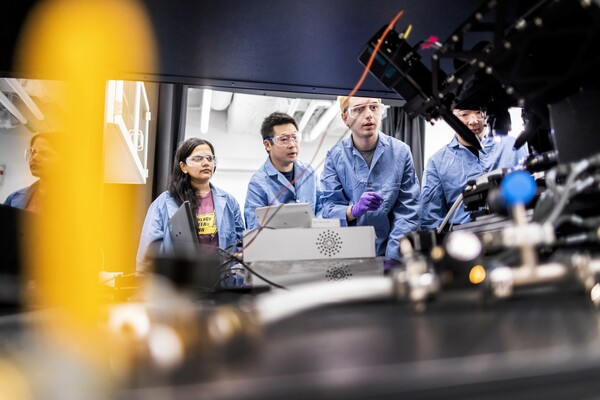
nocred
The ethnic Chinese population of Greater Philadelphia is less than 50,000. Yet this small population, which includes immigrants and their descendants from the mainland, Taiwan and Hong Kong, supports five community choirs. One of these groups, Chinese Musical Voices, is conducted by Hirschmann-Makieni Professor of Chemistry Hai-Lung Dai.
Why the great interest in music among Chinese Philadelphians? “The people who join like to have some contact with Chinese culture, and through music, they have that contact with their cultural heritage,” said Dai.
Making music gets Dai as excited as the molecules he studies in Penn’s science labs, and he has been involved with it for at least as long as he has studied chemistry. As a high school student in Taipei, Taiwan, Dai joined a community choir; when he enrolled at National Taiwan University, he joined the choir there, becoming its assistant conductor in his junior year. As a graduate student at Berkeley, he conducted the Berkeley Chinese Students Choir, and when he became a postdoctoral fellow at MIT, he conducted the Boston Chinese Philharmonic Choir.
“As you can see, music has been part of my life,” he said.
Dai has been the conductor of the Collingswood, N.J.-based chorus since it was founded 16 years ago by Joan McIntyre, a sometime Penn language instructor who is of Chinese descent, and Drexel professor of mechanical engineering T.M. Tan.
Neither Dai nor the 30 or so members of Chinese Musical Voices have had formal training in music. That suits him just fine. “It’s very rewarding to see 30 people, 80 percent of whom have never been in a chorus, and to take a group like this and make something enjoyable,” he said.
The high point of Dai’s conducting career came in 1995, when the City of Philadelphia staged a concert at the Academy of Music to celebrate the 125th anniversary of Chinatown. Dai conducted a chorus of 200 voices, including 100 members of the Mendelssohn Club of Philadelphia, and a 70-piece orchestra composed of Philadelphia Orchestra musicians.
Dai’s chorus is also a staple at the University of Pennsylvania Museum’s annual Chinese New Year celebration, having performed there “at least a half-dozen times within the last decade,” including this year.
The music Chinese Musical Voices performs is similar in structure and arrangement to Western music, Dai said, because many Chinese composers studied in the West. “But the subject matter they write about is different. They also borrow from traditional melodies. This is what the members really like.”
Chinese Musical Voices has even commissioned original works from well-known Chinese composers. “We are probably the only choir outside Taiwan and Hong Kong that commissions well-known Chinese musicians to write works,” he said.
Further blurring the distinction between Dai’s ensemble and a professional chorus, the group has also had success with broadcast exposure. Selections from the group’s 15th anniversary CD, “Your Dream,” have aired on Taiwan’s Chinese Broadcasting Corporation.
Dai notes that teaching and being a conductor draw on the same set of talents. “Once you know music, it is the ability to inspire, relate and connect with the musicians that makes the difference,” just as those qualities are the key to success in the classroom, he said.
Chinese Musical Voices’ next concert is on May 1 at 7:30 p.m. at Trinity Memorial Episcopal Church, 2212 Spruce St. More information about the chorus and “Your Dream” is available online at www.chinesemusicalvoices.org.
Sandy Smith

nocred

Image: Pencho Chukov via Getty Images

The sun shades on the Vagelos Institute for Energy Science and Technology.
nocred

Image: Courtesy of Penn Engineering Today